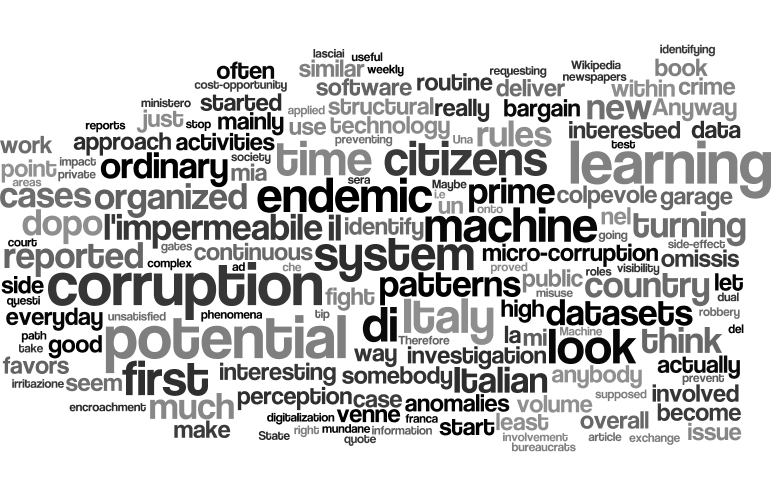Viewed 5063 times | words: 1123
Published on 2019-01-26 18:18:26 | words: 1123

Recently, Italian newspapers reported of successes on the use of software to pre-empt potential crimes in Italy.
Interesting application of machine learning and artificial intelligence.
Oh, what is machine learning? I will let you have a look on Wikipedia, if you are interested https://en.wikipedia.org/wiki/Machine_learning
Anyway, a funny joke might be useful:

The concept is that, at least in some variants, you can have the data by themselves outline the patterns, clustering of information, and help identify what to watch out for (or any "rules").
Yet, preventing a robbery here and there thanks to technology doesn't really deliver a long-term perception of an increase in safety.
Yes, those cases increased the security perception- but mainly in the media, and for a fleeting second with ordinary citizens: but I am quite confident that will make good PR for all those professionally involved, for much, much longer.
That same technology would have a much higher potential impact, if applied to more mundane, routine, everyday, interactions of citizens and State.
A short digression on the overall environment.
Italy is a country where routinely new watchdogs are created, turning often mainly into somebody that you invite to present statistics and deliver wonderful speeches about what should be done.
But Italy is also a country were we seem to have a continuous unsatisfied crave for new laws, regulations, and other forms of structural constraints that are supposed to... save us from ourselves.
Any overly complex system actually opens the door to something else.
It has been endemic, but recently the "L'Espresso", an Italian weekly, published an interesting article on micro-corruption.
What surprised me was to read how endemic micro-corruption has become: the magazine reported of bribes shrinking down to few hundreds EUR, or exchanges of favors.
Both the fight against corruption and the fight against organized crime encroachment within the Italian society share a similar cost-opportunity issue.
Or: so endemic, that a blanket, continuous investigation to really prevent is technically impossible.
Therefore, we end up often being happy with just routine "prime time" reports whenever a critical mass is reached, and an investigation or arrests are launched and reported, justifying the overall continuing costs.
Anyway, both phenomena are not made of "tip of the iceberg", high volume and high visibility cases suddenly appearing on some desk.
Within all those prime time cases, probably organized crime has the time and resources to alter patterns that delivered a successful court case for the prosecution.
But, on the other side, petty corruption and exchange of favors are actually relying on a kind of "lottery"- if everybody does it, why should just a specific perpetrator be caught?
Moreover, human investigations, when misuse of roles is endemic, have a structural flaw: eventually, anybody to survive has to "ask a favor" or ignore reality.
I would like to quote here a book from Raffaele Costa, an italian politician: "Una sera qualsiasi di un anno che non ricordo, lasciai nell'auto di servizio (alias auto blu) l'impermeabile. L'auto venne rinchiusa nel garage del ministero. Il mattino dopo l'indumento era scomparso. Manifestai la mia irritazione ad alcuni collaboratori. Uno di questi, <omissis>, un paio di giorni dopo mi si avvicinò e mi disse all'orecchio: 'ma lei rivuole l'impermeabile o individuare e punire il colpevole?" <omissis> il giorno dopo l'impermeabile venne ritrovato, misteriosamente, nel garage. Naturalmente il colpevole la fece franca." (from "La mia Prima Repubblica", page 185).
If somebody with his political pedigree accepted the bargain, what do you expect from ordinary citizens and bureaucrats?
Both private citizens and anybody holding office are used to everyday bargains- in any country.
As showed by an old book on the history of corruption since well before the Roman Empire, corruption has been there in any organized system- the issue is when system rules seem to become designed with so many loopholes and "gates" to enable corruption.
Or: when you first think to a bargain, then to rules: as it means that you are turning the extraordinary into ordinary.
So, it is better to think about a potential interesting use of Machine Learning.
Have the datasets of the "paper trails" of those misuses that were identified, and let the machine learning identify patterns.
Then, have the same run across other datasets that involved similar activities.
A first test case would make sense where datasets (and potential repeats) are more frequent, i.e. in larger towns or high-volume activities.
The positive side would be to have then a dashboard highlighting potential areas to investigate- with humans.
Obviously, this would be a dual path- working the traditional way, while another team would work the other way: as, anyway, this approach would work on what has already been proved before.
The point is reducing the volume and turning "prime time" into a "constant stream"- enough to generate a deterrent.
If you think that this is crazy, have a look at how the "Mani Pulite" in the early 1990s started from a meaningless small amount.
Then, look at how, for a while, the side-effect was a reduction within the cost of public tenders.
Finally, look at how the system "adjusted" after a while- and things turned as were before, reaching today's status.
It would take generations before we Italians will stop thinking first to "who you know" and then "what is the right sequence of steps to follow".
But, at least, it would be a cheaper and more effective start than current methods: as, if the machine learning approach is started, it would highlight what the data say, not what it is convenient to say.
As Italy is now going onto the digitalization of every administrative process, from requesting a new ID, to applying for a permit, a first attempt at identifying automatically anomalies would be a good start.
Maybe as an internship for few software engineering and public procurement newly graduated students?
The point is starting to decouple first-level identification of anomalies from the direct involvement of potentially interested parties.
 _
_